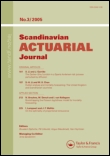
Scandinavian Actuarial Journal
Scope & Guideline
Advancing statistical excellence since 1918.
Introduction
Aims and Scopes
- Risk Modeling and Assessment:
The journal emphasizes the development and application of models for assessing various types of risks, including life, health, and financial risks. This includes advanced stochastic models, collective risk models, and methodologies for estimating ruin probabilities. - Investment Strategies and Financial Engineering:
Research on optimal investment strategies, especially in the context of pension funds and insurance products, is a core focus. This includes studies on asset-liability management and the interplay between insurance and investment. - Insurance Pricing and Valuation:
The journal covers methodologies for pricing insurance products, including variable annuities and reinsurance contracts. It explores innovative approaches to valuation that incorporate complex financial and risk factors. - Statistical and Computational Methods:
There is a strong emphasis on the use of statistical techniques, machine learning, and computational methods in actuarial science. This includes applications of Bayesian methods, copula models, and ensemble forecasting techniques. - Socioeconomic Impacts and Policy Design:
The journal also addresses the socioeconomic implications of actuarial practices, exploring topics such as demographic disparities in insurance pricing and the design of pension systems to enhance financial security.
Trending and Emerging
- Cyber Risk and Data Security:
Recent publications have increasingly focused on cyber risk modeling and the implications for insurance portfolios. This trend underscores the importance of addressing new risks associated with digital transformation and data breaches. - Advanced Machine Learning Techniques:
There is a significant uptick in the application of machine learning and artificial intelligence in actuarial science, particularly in pricing, forecasting, and risk assessment. This reflects a broader trend towards data-driven decision-making in the industry. - Intergenerational Risk Sharing and Pension Design:
Research on intergenerational risk sharing within pension systems has gained traction, indicating a growing interest in sustainable pension design that considers the long-term implications for multiple generations. - Complex Dependencies in Risk Models:
The journal is witnessing an increase in the exploration of complex dependencies among risks, particularly through the use of copula models and multivariate approaches, which enhance the understanding of joint risks in insurance. - Sustainability and Environmental Risks:
Emerging themes related to sustainability, including the assessment of environmental risks and their impact on insurance products, are becoming more prevalent, reflecting a shift towards incorporating social responsibility into actuarial practices.
Declining or Waning
- Traditional Risk Models:
There is a noticeable decline in the publication of papers focused solely on traditional risk models, such as basic actuarial models that do not incorporate advanced dependencies or modern statistical techniques. - General Mortality Forecasting:
While mortality forecasting remains a critical area, there is a shift away from simpler mortality models towards more complex, hybrid approaches. This indicates a waning interest in basic methodologies that do not integrate newer statistical advancements. - Static Insurance Pricing Models:
Static models for insurance pricing that do not consider dynamic factors or advanced data analytics are becoming less common. The focus is shifting towards more dynamic and adaptive models that incorporate real-time data and predictive analytics.
Similar Journals
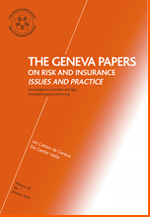
GENEVA PAPERS ON RISK AND INSURANCE-ISSUES AND PRACTICE
Elevating Standards in Risk Assessment and Policy DevelopmentGENEVA PAPERS ON RISK AND INSURANCE-ISSUES AND PRACTICE is a leading academic journal dedicated to advancing the fields of risk management and insurance, published by the esteemed Palgrave Macmillan Ltd. With an ISSN of 1018-5895 and an E-ISSN of 1468-0440, this journal serves as a pivotal platform for sharing cutting-edge research and practical insights addressing a diverse range of issues within the insurance sector. Established in 1999, it spans a wide array of topics, including risk assessment, financial implications, and policy development, contributing to its recognition in the Q2 quartile across multiple categories such as Accounting and Economics. With a notable Scopus ranking reflecting its relevance—ranked #229/716 in Economics and Econometrics, and #106/317 in Finance—it provides invaluable resources for scholars, professionals, and policymakers alike. Despite being a non-open-access journal, the GENEVA PAPERS ensures a rigorous peer-review process, aiming to uphold the highest standards of scholarly publication. Whether you are a researcher looking to publish groundbreaking studies or a practitioner seeking the latest trends and analyses in the insurance landscape, this journal stands out as an essential resource in the domain.

Journal of Computational Finance
Exploring the intersection of finance, mathematics, and technology.Journal of Computational Finance, published by INCISIVE MEDIA, stands at the forefront of interdisciplinary research, amalgamating the realms of finance, applied mathematics, and computer science. With its ISSN 1460-1559 and E-ISSN 1755-2850, this journal provides a vital platform for scholars and practitioners alike, aiming to advance methodologies and computational techniques that enhance financial decision-making processes. Although currently categorized in the Q3 quartile across various disciplines—including Applied Mathematics, Computer Science Applications, and Finance—its commitment to quality research is unwavering, as evidenced by its curated selection of innovative studies. The journal’s scope includes computational modeling, algorithmic trading, risk management, and quantitative finance solutions. Each volume seeks to not only foster academic discourse but also bridge theoretical findings with practical applications in the financial industry. Given its convergence from 2011 to 2024, the journal continues to evolve alongside the rapidly changing financial landscape, supporting researchers, students, and professionals in navigating the complexities of computational finance.

Annals of Finance
Exploring the Frontiers of Financial Theory and PracticeThe Annals of Finance, published by Springer Heidelberg in Germany, stands as a pivotal journal within the realms of Economics, Econometrics, and Finance. With a dedicated convergence of research from 2005 to 2024, this esteemed publication features thought-provoking articles that address both theoretical and practical aspects of finance, earning it a commendable Q2 category ranking in the 2023 metrics for both Economics, Econometrics and Finance as well as Finance. The journal serves an essential role in disseminating knowledge and fostering advancements in the field, appealing to researchers, professionals, and students alike. Its rigorous peer-review process ensures the integrity and quality of published works, making it a reliable source for cutting-edge findings and discussions within the finance community. For those looking to navigate the complexities of modern finance through rigorous research, the Annals of Finance is an invaluable resource.
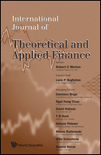
International Journal of Theoretical and Applied Finance
Empowering researchers with a platform for financial excellence.International Journal of Theoretical and Applied Finance is a distinguished publication in the field of finance, serving as a critical platform for the dissemination of innovative research and theoretical insights since its inception in 2003. Published by World Scientific Publishing Co Pte Ltd in Singapore, this journal boasts an impressive Q2 ranking in the realms of Economics, Econometrics, and Finance (miscellaneous) and a solid Q3 status in Finance for 2023. With a commitment to advancing knowledge in the complex world of theoretical frameworks and applied financial practices, it welcomes original research articles, comprehensive reviews, and case studies that explore varied facets of finance. Researchers, professionals, and students benefit from the journal's rigorous peer-review process and an ever-expanding repository of knowledge, making it an indispensable resource in the financial academic community. The journal does not currently offer open access, reflecting its selective approach to publishing high-quality content aimed at a specialized audience.
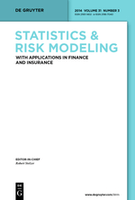
Statistics & Risk Modeling
Illuminating the path of statistical excellence in risk management.Statistics & Risk Modeling is a distinguished journal published by WALTER DE GRUYTER GMBH, focusing on the intricate relationships between statistical methodologies and risk assessment techniques. With a strong academic foundation, the journal has been an influential platform in its field since its inception, converging contributions from 1982 to 2002 and again from 2011 to 2024. This journal is currently ranked in the Q3 category in both Modeling and Simulation and Statistics and Probability, reflecting its commitment to advancing knowledge and promoting robust research in statistics, probability, and uncertainty analysis. Although it offers a traditional subscription model, its significant contribution to the community is underscored by its increasing visibility in Scopus rankings, where it stands in the 44th percentile for Decision Sciences and Statistics. By comprehensively addressing contemporary issues in statistical theory and its practical applications, Statistics & Risk Modeling serves as an essential resource for researchers, professionals, and students aiming to deepen their understanding of statistical science and its implications in risk management.

Journal of Risk Model Validation
Enhancing Financial Insights with Validated Risk ModelsJournal of Risk Model Validation, published by INCISIVE MEDIA, is a pivotal scholarly platform dedicated to the fields of Applied Mathematics, Economics, Econometrics, and Finance. With an ISSN of 1753-9579 and an E-ISSN of 1753-9587, this journal actively contributes to the advancement of knowledge through the rigorous validation of risk models, which is essential for informed decision-making in business and economic contexts. Although currently not an Open Access journal, it serves a vital role in the academic community, evidenced by its categorization in the Q4 and Q3 quartiles across various relevant fields. As of 2023, it holds commendable Scopus rankings, reflecting its relevance and engagement within the global academic discourse. The journal encourages submissions from a wide array of researchers, professionals, and students until 2024, fostering a comprehensive exploration of risk model methodologies and their practical applications. Emphasizing both theoretical frameworks and empirical studies, the Journal of Risk Model Validation is an essential resource for those dedicated to enhancing the reliability and effectiveness of risk assessment in contemporary finance and economics.

International Review of Finance
Bridging theory and practice in global finance.International Review of Finance is a prestigious academic journal published by Wiley, located in the United Kingdom. With its ISSN 1369-412X and E-ISSN 1468-2443, this journal serves as an essential platform for researchers and practitioners in the fields of Economics and Finance. Ranked in the Q2 quartile for both Economics and Econometrics and Finance as of 2023, it showcases high-quality research that contributes significantly to theoretical and practical advancements. Reflecting its standing, the journal is positioned in the 61st percentile in Economics and Econometrics and the 60th percentile in Finance according to Scopus rankings. The scope of the journal includes a diverse range of topics, encouraging innovative discourse across various financial disciplines. Although it does not offer open access, the International Review of Finance continues to be an important resource for academics, professionals, and students seeking to deepen their understanding of evolving financial theories and practices.

SIAM Journal on Financial Mathematics
Advancing Knowledge at the Intersection of Math and FinanceThe SIAM Journal on Financial Mathematics, published by SIAM PUBLICATIONS, is a premier journal dedicated to the intersection of applied mathematics and finance. With an ISSN of 1945-497X, this journal serves as a vital platform for the dissemination of innovative research that addresses complex financial problems through mathematical modeling and analytical techniques. The journal has established itself within the Q2 quartile in the categories of Applied Mathematics, Finance, and Numerical Analysis, reflecting its influence and significance in these fields. Researchers and practitioners will find a wealth of knowledge spanning topics from stochastic calculus to quantitative finance, making it essential for anyone aiming to advance their understanding of financial mathematics. As the journal continues to converge from 2010 to 2024, it promises to remain a cornerstone resource for academics, professionals, and students alike, facilitating the ongoing dialogue between mathematics and its applications in the financial industry.
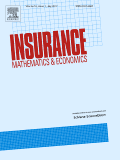
INSURANCE MATHEMATICS & ECONOMICS
Pioneering research at the crossroads of mathematics and finance.Insurance Mathematics & Economics, published by Elsevier, stands as a pivotal journal in the fields of economics and statistics, carrying the ISSN 0167-6687 and E-ISSN 1873-5959. Established in 1982, this journal aims to disseminate high-quality research that integrates insurance theory with economic principles, making significant contributions to both academic and practical spheres. With a notable Q1 ranking in the 2023 category quartiles for Economics, Econometrics, Statistics, and Probability, and a solid standing in Scopus ranks, it ranks #64 out of 278 in Mathematics and #45 out of 168 in Decision Sciences, showcasing its relevance and prestige in the research landscape. The journal not only facilitates a deeper understanding of insurance-related mathematical methodologies but also emphasizes the application of these techniques in real-world economic contexts. Researchers, professionals, and students alike can benefit from its rigorous approach to the challenges faced in insurance and economics, making it an essential resource for anyone involved in these dynamic fields.

Computational Economics
Transforming Economic Analysis through Computational Methods.Computational Economics is a premier journal dedicated to advancing the interdisciplinary field that bridges computational methods and economic theory. Published by Springer in the Netherlands, this journal serves as a critical platform for researchers and practitioners from economics, econometrics, and computer science, fostering innovation and cross-pollination of ideas from 1993 to 2024. With a notable impact factor in its categories—ranking Q2 in Economics, Econometrics, and Finance and Q3 in Computer Science Applications—Computational Economics consistently delivers rigorous peer-reviewed research that addresses contemporary challenges in economic modeling and computational techniques, making it an indispensable resource for the academic community. The journal provides a range of access options and is indexed in Scopus, where it holds a strong position in the 78th percentile of its category, ensuring high visibility and engagement for published works. Researchers, students, and professionals will find valuable insights across its diverse scope, facilitating the exploration of new methodologies that shape the future of economic analysis.